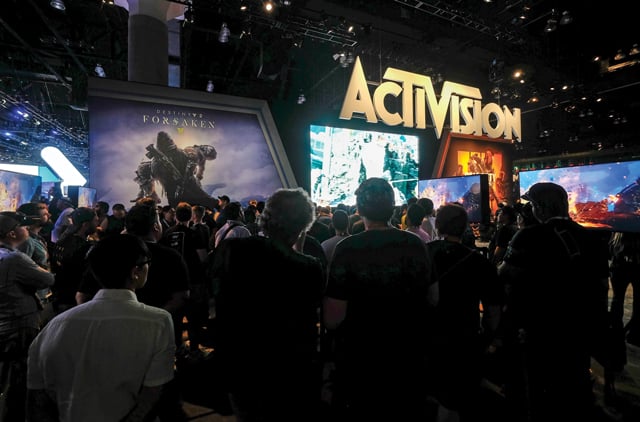
Are there chinks in Activision Blizzard Inc.’s armor?
The Santa Monica-headquartered video game stalwart faces market backlash and lawsuits over severed ties with game developer Bungie Inc.
The Bungie breakup came after the departure of company executives, a drop in quarterly revenue and a share price that was already in decline.
Industry watchers warn against sounding the alarm bells too fervently, however. Forty-year-old Activision, which declined comment for this article, is the best-selling video game publisher in the world, and there likely nothing on the horizon to change that.
“Activision has several strong franchises that continue to do well,” said Joost van Dreunen, co-founder of SuperData, a Nielsen Holdings company that tracks the video game industry.
Still, the company may need to rethink how it distributes games, said Anthony Borquez, a USC Marshall School of Business professor – and also might simply need more games to distribute.
“There is a new generation of gamers, and Activision needs to keep a pulse of how the industry is changing,” Borquez said.
Bungie jump
The partnership with Bellevue, Wash.-headquartered Bungie first looked like another home run for Activision.
Activision brought to market in 2014 the “Destiny” title developed by Bungie and touted that the video game raked in $325 million during its first five days on the market − at the time, a record opening for a title.
But the sequel, “Destiny 2: Forsaken,” underperformed expectations, then-Activision Chief Financial Officer Spencer Neumann noted in the company’s third quarter earnings call, without elaborating why.
The franchise was relegated to No. 5 on Activision’s list of bestselling games, trailing Call of Duty, World of Warcraft, Overwatch and Candy Crush.
Activision and Bungie announced Jan. 10 that they planned to end their relationship, two years before a 10-year contract was set to expire.
“Since ‘Destiny 2’ wasn’t on par with its predecessor it’s possible that rather than accept a subpar performance of a possible Destiny 3 down the line, Activision offered Bungie to take it independent,” Van Dreunen said.
The day after the Bungie announcement Activision’s stock price fell $4.81 to close at $46.54. The stock price has hovered at that level since, closing Jan. 31 at $47.24.
The stock decline triggered five separate lawsuits filed on behalf of investors who bought Activision stock between August 2018 and last month.
The lawsuits, which list Neumann and Robert Kotick, Activision’s chief executive since 1991, as co-defendants, claim company executives deceived investors by not warning they might end their Bungie agreement.
“At this stage, I don’t have any belief the lawsuits will affect the company’s bottom line,” said John Cannon, a securities defense lawyer at Stradling Yocca Carlson & Rauth.
That could change, Cannon said, if litigants uncover evidence Activision falsely represented to shareholders its Bungie dealings or failed to disclose that the partnership unraveled months before the separation was announced.
No new games
Activision’s stock value was slipping before the Bungie separation. The price has dropped 44 percent from a September peak of $83.19, a high point that preceded the release of “Call of Duty: Black Ops 4.”
The company’s stock was trading at $72.49 one year ago, with a market capitalization of $54.9 billion. Activision’s market capitalization has sank 35 percent in the last year to approximately $35 billion.
Activision also last month fired Neumann who quickly resurfaced at Netflix Inc. Also, Amrita Ahuja, chief financial officer of Activision’s personal computing game arm Blizzard Entertainment, exited the company for a finance job at Square Inc.
Each were replaced by internal hires.
Activision’s operating income, meanwhile, ticked up in the third quarter of 2018 compared to 2017, to $265 million from $257 million, but its revenue dipped to $1.52 billion from $1.61 billion.
The revenue numbers are not of concern, said Borquez, of USC, but the revenue sources might be in the future.
Activision noted in its last annual report that “66 percent of our revenues and a significantly higher percentage of our operating income” came from its big four of Call of Duty, Candy Crush, World of Warcraft and Overwatch.
Activision dropped Destiny but has not announced new games for 2019. The company’s last major acquisition was purchasing King Digital Entertainment for $5.9 billion in 2016, which gave it Candy Crush and an entry into the market of games played mostly on phones.
“It’s great to have these tent pole franchises like Call of Duty, but they have been living off these franchises for years,” Borquez said. “I think every company needs to continue with new intellectual property.”
Platform preferences
Activision’s main competitors by market share are Redwood City’s Electronic Arts Inc., which has a market capitalization of around $27 billion, as well as New York City-based Take-Two Interactive Software Inc. and France-headquartered Ubisoft Entertainment.
Also in the mix is Cary, N.C.-headquartered Epic Games Inc., creator of Fortnite, plus an upcoming online Epic Games Store.
The Epic Store will compete with the Valve Corp.’s Steam distribution platform, which has emerged as “the primary source,” Borquez said, to buy video games that one can play on a personal computer, as opposed to console or phone.
“Everybody in the industry is trying to figure out what will happen in the future with distribution,” Borquez said.
He asserted that more publishers might join Epic with their own distribution service and might experiment more with providing free games to download, while depending somewhat less on physical units sold.
Activision has usually been on the cutting edge of such industry changes, Borquez said, but it is not clear if the company might significantly change its distribution plan.
